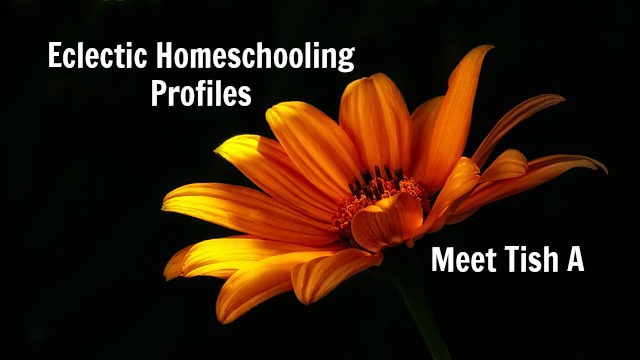
Eclectic homeschooling involves meshing different educational philosophies and methods into something that works for your family. As a result this will look different from family to family. We are featuring a series of interviews with eclectic homeschoolers to show how varied eclectic homeschooling can be.
Meet Tish A!
Why did you decide to homeschool?
We decided to homeschool because the public school system didn’t seem to challenge our children. Their classrooms were crowded, their teachers were overwhelmed but the amount of negative student behavior and 2 out of 3 of our children “don’t test well”. They were denied access to our districts magnet programs because despite their straight A’s they scored poorly on standardized tests.
How long have you been homeschooling?
Off and on for 8 years. First with our oldest for a year in 5th grade. Then with our now 13 year old for part of 5th grade. Now with our 7, 9, and 13 year old.
What ages/grades are you homeschooling?
7 year old 2nd grader, 9 year old 4th grader, and 13 year old 8th grader.
What were your results on the What Kind of Homeschooler Are You Quiz?
Score for Waldorf Education: 13
Score for Traditional Education: -10
Score for Unit Studies Education: 15
Score for Montessori Education: 11
Score for Thomas Jefferson Education: 8
Score for Unschooling: 18
Score for Classical Education: -3
Score for Charlotte Mason Education: 19
Use 3 words to describe your homeschool:
eclectic, literary, homie
What makes your homeschool eclectic?
We use varied curriculum and don’t subscribe to just one philosophy. My children use textbooks, living books, games, YouTube videos, workbooks, art, music, workbooks, and any other resource I can find to fit their needs and learning styles. We follow rabbit trails when we want to and I don’t “test” my children with pen and paper. I want them to learn about the world, cultures, and how things fit into the bigger picture along with basic skills. Math might be making a recipe for lunch that requires measurement or science might me nature study or watching a documentary. Each day varies and it’s about what works for us.
Have you always been an eclectic homeschooler?
I used to purchase complete curriculums. I’d spend the year stressing myself and the children trying to get all of the work done. Some stuff wouldn’t be used and I’d spend my time recycling it for the next student or feeling guilty for buying something we didn’t use. Now, I research and buy things that fit everyone along with specific things for each child. I used to be focused on standards and keeping up with kids in public school that are in their “grade”. Now I’m using various tools that teach and strengthen them where they’re weak, on their level, and above their level.
What do you think makes your homeschool unique?
We are more focused on pleasure, diversity and mastery. I don’t focus on how fast they learn a skill. We practice until they can do it on their own. I don’t test them every quarter or every month. This is not a competition but small acts that lay a foundation for what my children will eventually build on it. I think vocation and I know that changes. At each stage of their life it is important that they have time to spend focusing on what they like and exploring.
What does a typical day or week look like in your homeschool?
We start school between 8:30 and 9:00 am each day. Some days it’s with a read aloud, others it’s a project that someone wants to lead.
The 7 and 9 year old complete their Bible Study homework for CBS (Community Bible Study) that we attend each Wednesday. While I’m helping with that (usually only the 7 year old) I’m writing their assignments on their planner or in their assignment notebook (spiral notebook with date and list of assignments/things to do).
My 13 year old usually has some questions for me and I will discuss what I want her to do before we all get to work.
They can complete their assignments in any order. There’s a checkbox next to each one. Usually before our break I check to see how much they’ve completed. In the past few weeks I’ve begun to move away from them while they’re working. I go into the living room where I can hear them (especially my constantly moving 7 year old son). I’m available for questions and I’m usually doing some planning, printing or prep for that day or the next.
10:30-11 We take a 10-15 minute break then get back to work for an hour or so before lunch
Lunch is an hour most days, 30 minutes on days when their has been a lot of distractions or if I’ve had to redirect them quite a bit.
Afternoons vary but a typical day will include at least 2 of the following options:
Learning games, outside time, science, history, more reading/read aloud or individual instruction like math, Sometimes we are reading, cooking, riding bikes, or creating. I have the luxury of very crafty and inventive children so I don’t usually dictate the afternoons.
What curriculum has worked in your homeschool?
Answers in Genesis Science – especially the experiments
Story of the World
Geography through Art
Living Books
You Tube videos and songs
Duolingo foreign language
Teaching Textbooks
Do you have any favorite homeschooling books?
The Well Trained Mind
Project Based Homeschooling
Do you tweak curriculum to work for you? Describe how you do that.
Yes. We skip things, we take out what works best and use that exclusively, We complete books and assignments out of order. We mix in lots of library books, oral reading, projects, coloring pages, and music. So I may read a selection from a textbook then reinforce the information with a game, a book, a video, or an assignment that requires them to do some independent research or learning. This year we have studied SOTW chronologically. So they’ve studied history broadly instead of studying only one time period. In math we skipped what they already knew and dove into more challenging areas of study. I take whatever fits us best and use it.
Anything else you would like to share:
It’s been difficult for me to make this transition. I have spent many years in early childhood and public school and have just started making our homeschool experience what I want it to be and what my children need it to be in the past few months. I have realized that my only competition is myself. So, we spend a lot less time toiling and a lot more time exploring.






